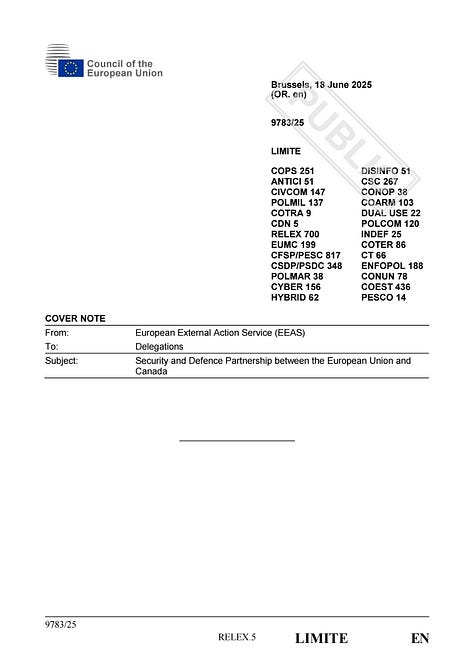
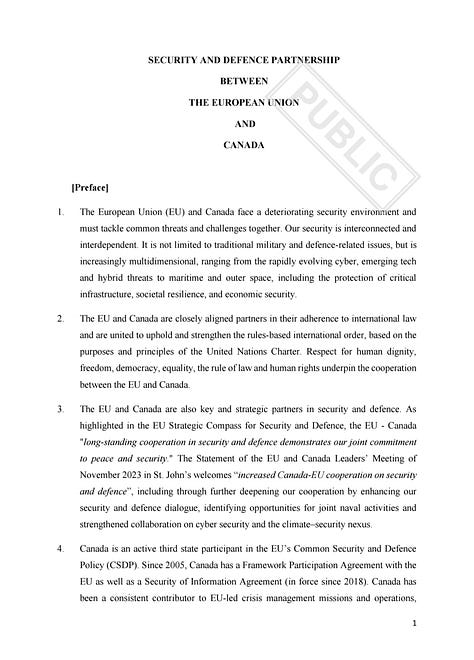
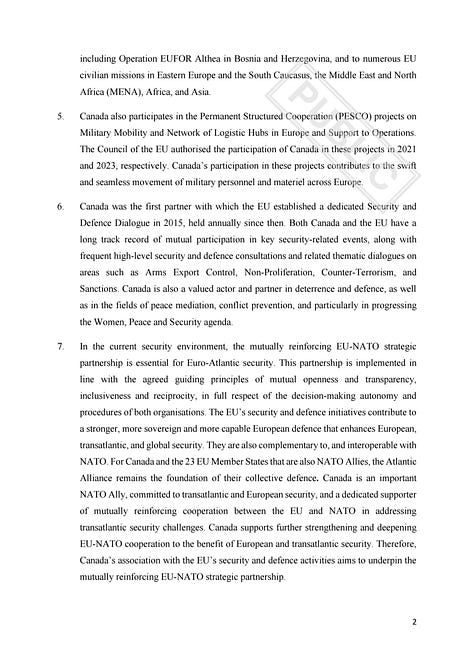
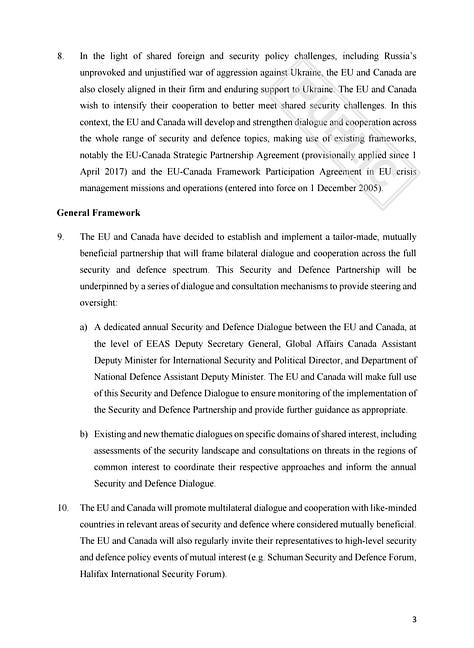
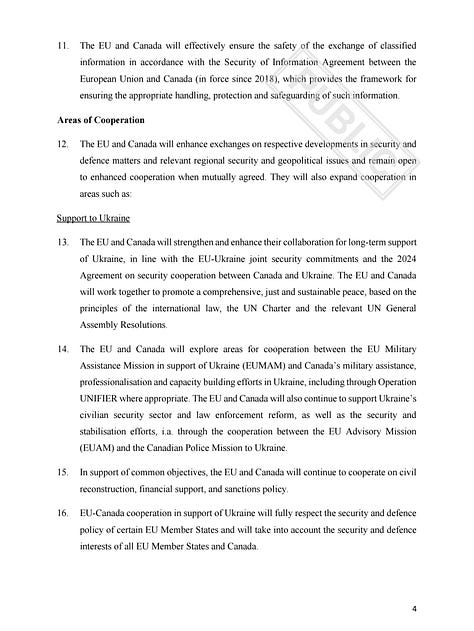
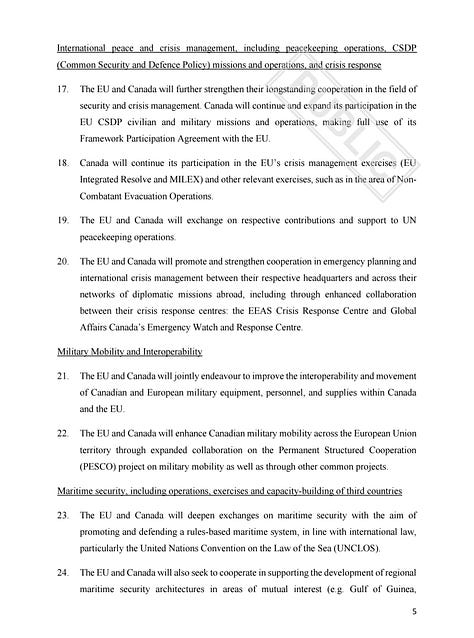
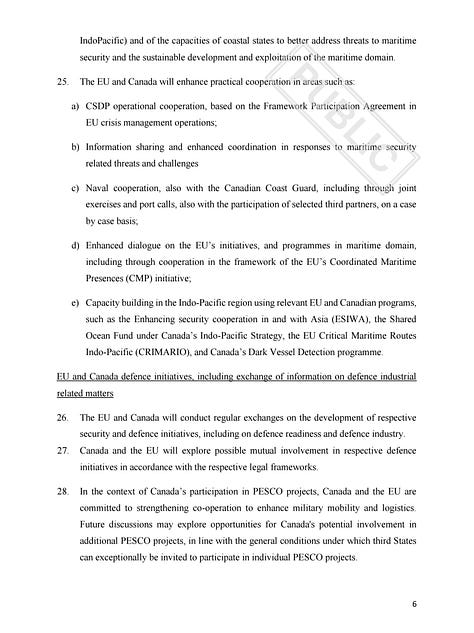
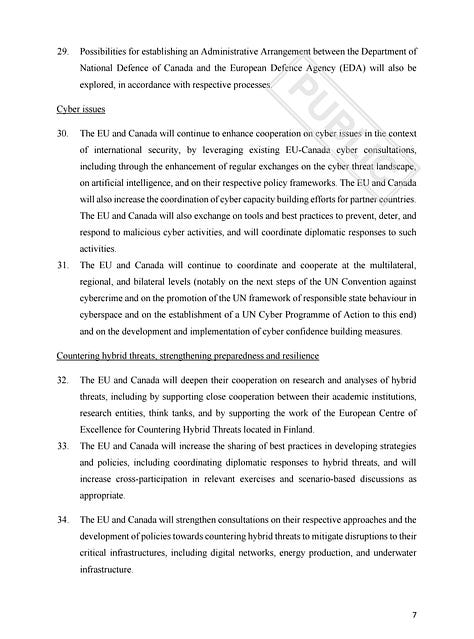
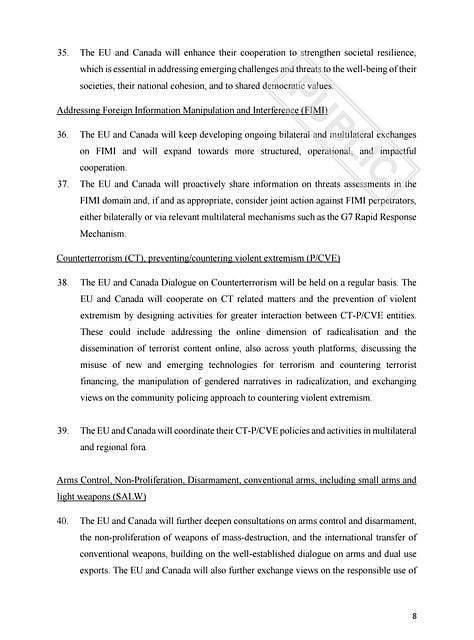
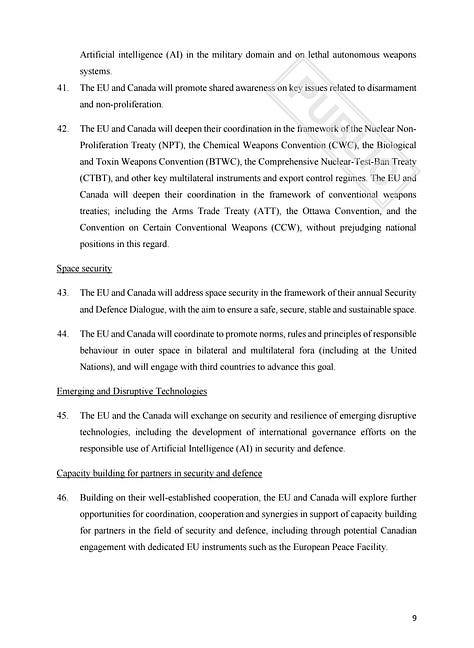
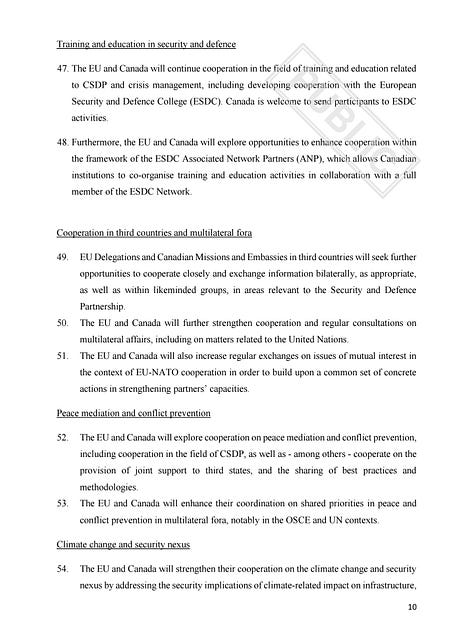
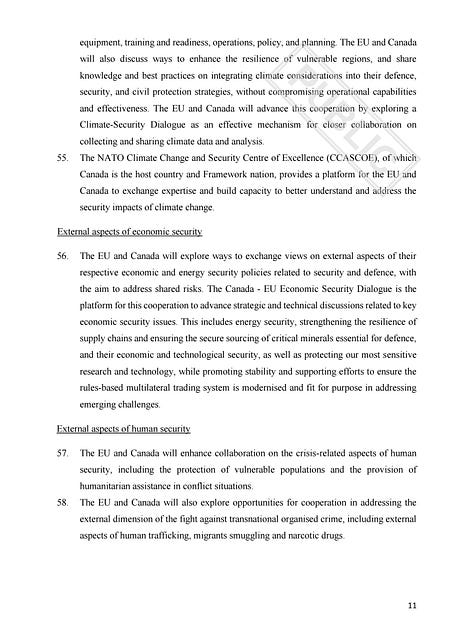
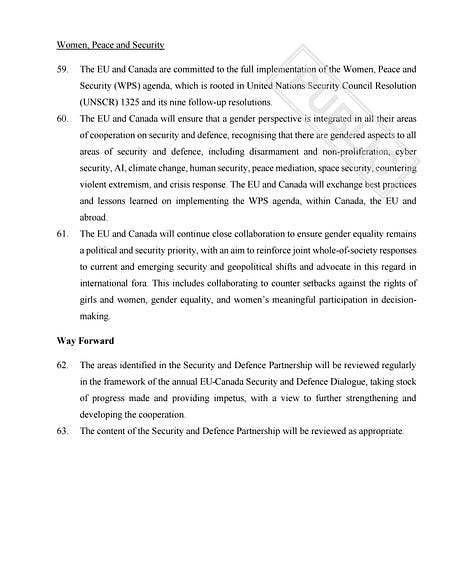
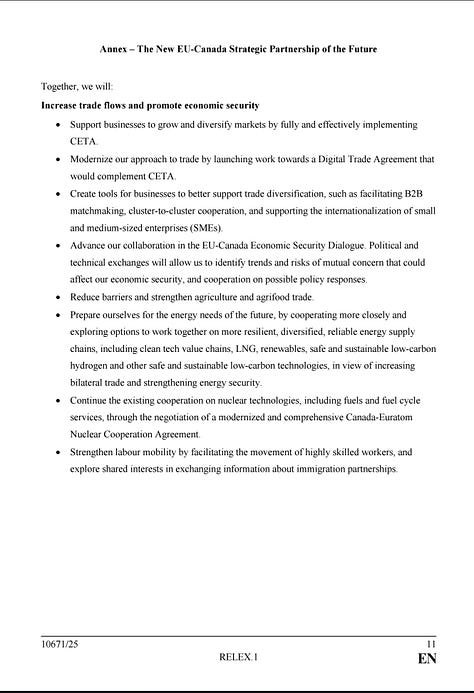
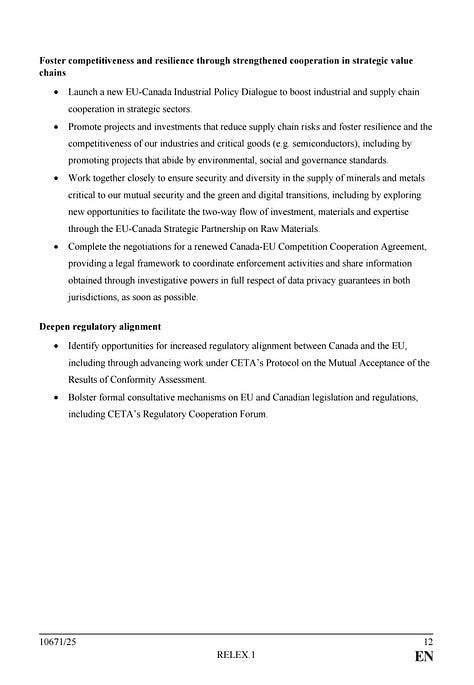
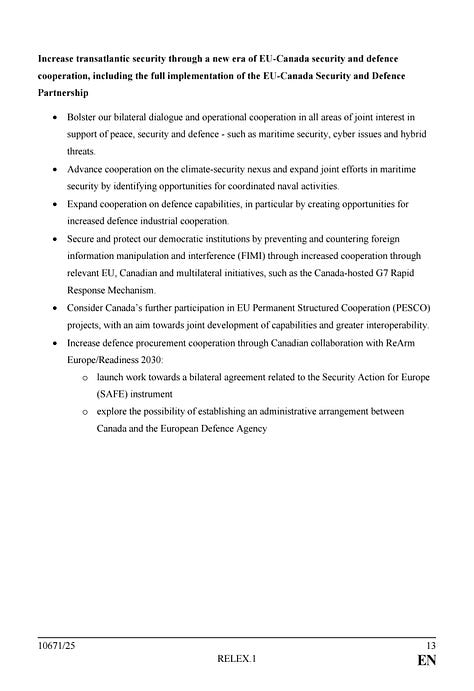
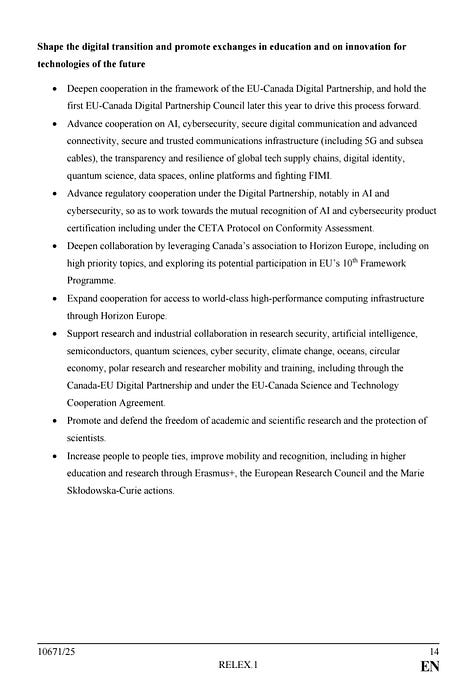
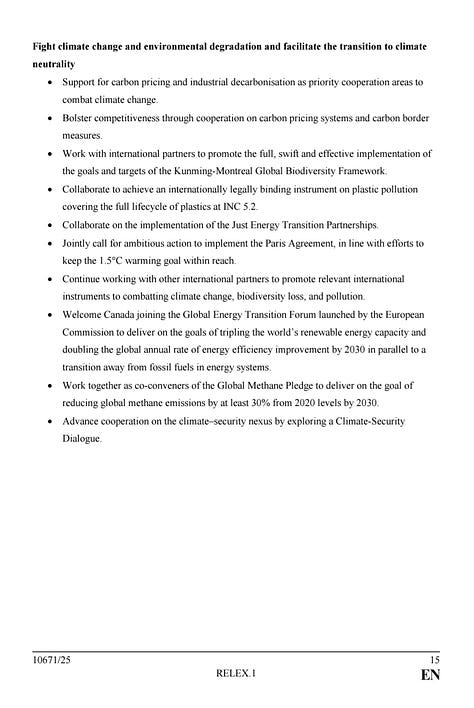
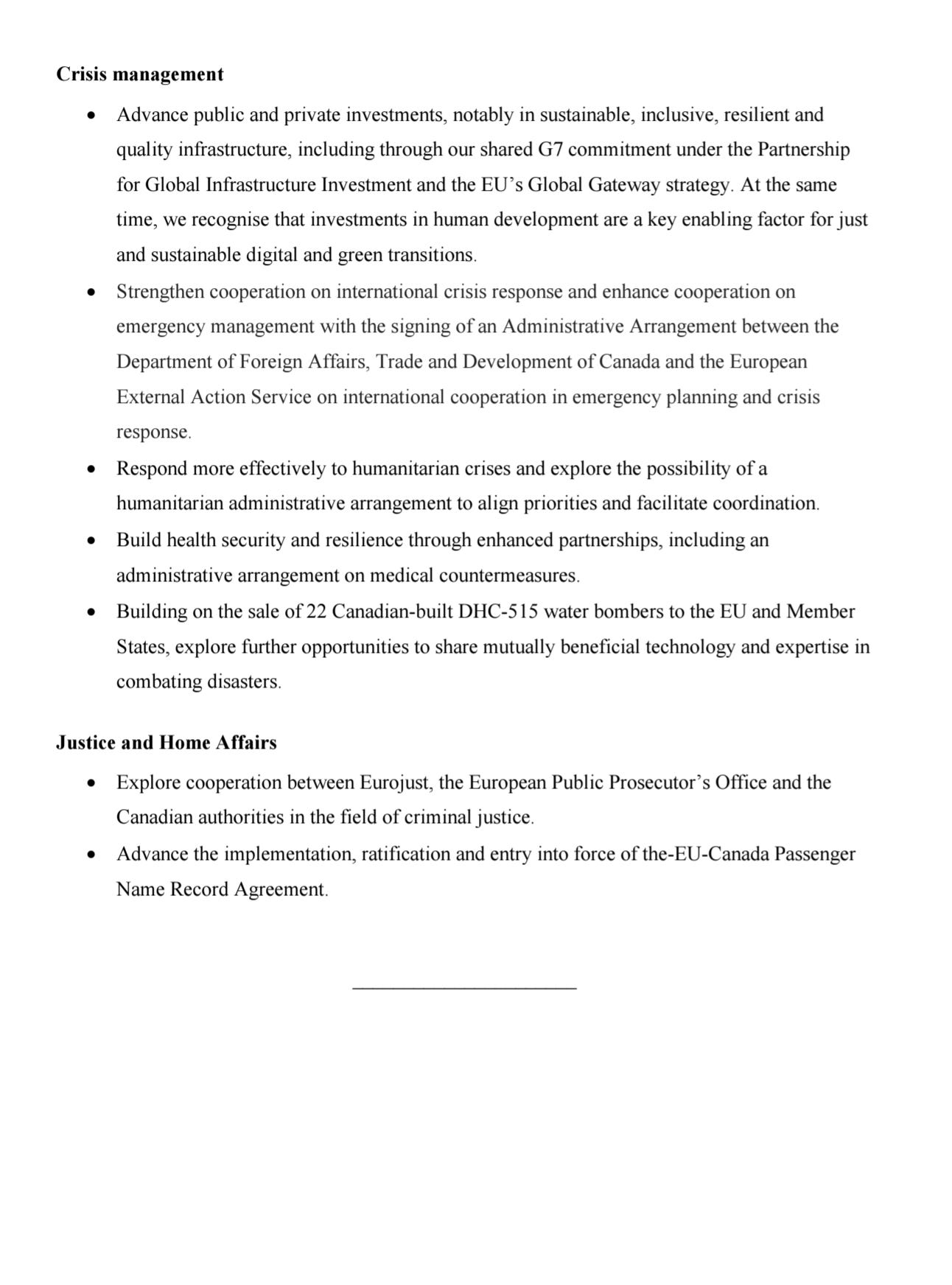
Canada and the European Union came together today to celebrate the yearly Canada-EU summit. A day before the start of the NATO summit, this week is set to be a major one, and Canada starts off hot with a comprehensive series of agreements that set the stage for what EU officials call ‘The most comprehensive agreement the EU has ever had'with another country.
From the start of the Carney government the prospect of a new, comprehensive agreement with the EU has been touted as the way to break our chains of American integration.
No Prime Minister has quite taken to the Atlanticist ideals quite like Carney has, at least for a long while. You can see the Europhile in him quite clearly whenever he speaks of Canada-EU relations.
For Carney today was the big day, the one he has been promising would come since first launching his campaign, and while only the beginning, the foundation has been laid for some fairly significant possibilities.
The Agreements
I have included the full Security and Defence Partnership for your viewing above, both so you can see it in clear for yourself and so that, admittedly, I didnt have to write the whole thing out.
Lazy? Yes, but at least I provide the text in its full, raw form as well as the highlights of the joint statement. The bulk of the talks today are related to Security amd Defence, though not exclusively.
Truthfully, it is a lot of the non-defence topics that caught my eye today. Perhaps thats because we had a fair idea of what was coming ahead of today's summit but today also opened a lot more avenues to deepening cooperation.
To give some highlight before we jump into defence, todays agreements include a number of policies that I have been hoping on for a long time. I am happy to see LNG given a shoutout. Many of you know I am supportive of expanding our LNG export capacity, especially in an area that can help supplement our allies supply from countries like Russia and Qatar, two states that work in opposition to our foreign policy and values, whom I would be more than happy to ween our partners from.
I am overjoyed to see Nuclear mentioned, especially cooperation on fuel. I suspect this is building off our previous funding for TRISO fuel for Small Modular Reactors, an area where we currently lack the independent capability to produce.
It's an area where we can not only be a major contributor both in the supply of minerals and technology but also an area where we can help diversify our own supply of fuel while we build up the capacity to supply ourselves.
Of course a lot of these are based off enchancing the existing agreements laid out in CETA. A lot of this is further commiting to the ratification of CETA, a long and slow process that the Carney government has been pushing to see done.
That is a lot easier said than done though. The issues that have hindered the ratification process, be it the ICS, agriculture and the difference of standards still exists, and while there is good commitment here to many of the cornerstones of the agreement, and talks of expanding on them, it still does not make the process of getting states like France and Italy, as examples of major players, to ratify CETA faster.
There are nuggets there, though, that I am happy to see like the proposed EU-Canada Industrial Policy Dialog. While no one likes meetings, and many are quick to dismiss, these kinds of bilateral efforts to enhance dialog play an improtsnt role in pushing forward policy and developing upon agreements.
The Canada-EU Competition Cooperation Agreement and further cooperation on labour mobility are other areas I am happy to see mentioned. Same as credential recognition.
It will likely fall under the radar, but expanding information sharing on this front will also go a long way at streamlining and opening up further mobility discussions. While we very much are not there yet, and while we will never be Schengen, these kinds of efforts could very much open the possibility for a ‘Pseudo-Schengen’ where the system is so simple and quick that it quickly allows for rapid movement across the Atlantic.
Grandiose? Yes, but Noah is nothing if not a dreamer. Further talk about expanding upon Canada's participation in Horizon Europe, cooperation on emerging technologies like Quantum, AI, and even Undersea Cables (yay)
Possible Canadian cooperation in the EU's 10th Framework Programme is also welcome. I am a bit disappointed that space wasn't mentioned more, and the overt focus on digital initiatives, but overall, while mostly basic and boring, there were little nuggets in this agreement I was happy to see.
The Defence Stuff
Now that you got to hear me nerd out we can move on to the important stuff with the Security and Defence Partnership, the new cornerstone of the Canada-EU security partnership. This agreement is the gem of todays summit, and takes up the bulk of todays discussions.
It is more comprehensive than I heard it would be, which is a good thing. The main foundations of this agreement are Canadian participation on Readiness 2030 and the SAFE initative.
Some publications are reporting that Canada has fully joined SAFE. This isnt accurate. What has been agreed upon is that we will work towards securing our full participation.
Canada will still be allowed to participate in some projects in the meantime, but we aren't in yet. Readiness 2030 also secured Canadian industries role as a supplier to SAFE as well. There are still seperate agreements beyond this to come, as Canada aims to go beyond the 35% allowance that others have gotten.
These are the first steps. Negotiations will continue from here, with the Canadian government hoping that a proper agreement can come into forve within the next few months.
Accessing the SAFE Initative is a critical goal of the current government, giving us access to a new source of cheap, long-term loans to help fund our rearmamant, while also deepening our economic ties with European partners by becoming suppliers on these joint procurements.
These were already known. These have been known for the last two weeks. The rest of the agreement, which till now was secret also contains its fair share of welcoming news and initiatives.
The twelve page agreement covers areas from Foreign Policy and Training to Cyber and Space. It is a very comprehensive document in my humble opinion and in happy to see that true care and dedication was put into covering multiple different areas.
The Partnership also establishes a renewed Security and Defence Dialogue to be held annually. This will give a chance to review the Partnership and provide a forum if discussion for Canada-EU defence policy.
It also establishing a commitment to expand upon multilateral dialogues and representation at respective events. While this, again, might seem boring to many these kinds of meetings provide an avenue for discussion, partnership formation, and sharing interests.
They are a critical piece of relationship building. It is these kinds of events where companies meet, representatives discuss agreements, and where important talks can be organized.
I love them, though maybe thats the consultant in me. I love these kinds of events and meetings. Ive seen first hand how wonderful they can be for building trust and policy. You should never discount them.
I wont be rating or discussing everything listed here. There is a lot of commitment to previous agreements amd policies, as there will always be with these sort of things.
I would say that there is a sense of vagueness to this document, and I know for many that will be a turnoff. However it is best to remember that this is not meant to be a final document. It is framework on which we establish priority and work to build off of.
To that you have to give some time to allow these important dialogues and discussions to happen.
While Readiness 2030 is the main cornerstone of this partnership it isnt the only area of Canada-EU cooperation given lots of love. The Permanent Structured Cooperation or PESCO is also given love, and I believe is equally as interesting.
For those who don't know PESCO is “ a treaty-based framework for the 26 participating Member States to jointly plan, develop, and invest in collaborative capability development and to enhance the operational readiness and contribution of armed forces.”
Canada already takes part in PESCO Military Mobility initative. This sets out a framework for the transporting of defence assets through the EU, as well as allows members unhindered access to cross-border movement.
A military Schengen Area basically, at least thats what they call it. Expanding on this is mentioned in the partnership, but the document also opens the door for further cooperation on PESCO.
See PESCO isnt just about logistics and standards. It is about integration. That includes things like C4ISR systems, Space-based assets, Undersea protection capabilities…
It also includes things such as Eurodrone, Autonomous Systems, Integrated Multi-Layer Air and Missile Defence system (IMLAMD), and the European Patrol Corvette.
Expanding our cooperative efforts into PESCO projects not only opens up great opportunities to take advantage of that SAFE funding but gives access to Canadian industry to take part in these multinational efforts.
With over forty seperate initiatives, covering a wide range of capabilities, there is ample room for Canada to participate and benefit from these large-scale procurements. Ot gives Canadian industry large projects in which they can participate in, opening themselves up to thr European market.
When combined with the ability to take part in Readiness 2030, and access to the Funding through SAFE, future participation in PESCO projects provides Canada the last of the Trinity in projects to actually take part in.
Because at the end of the day you can't really use the other two if you arent actually participating in any joint procurements. I highly recommend going through the list of them and getting all giddy on possibilities (pretending that EU projects aint a gamble)
To further help cement this relationship the partnership aims to explore establishing an Administrative Arrangement between the Department of National Defence and the European Defence Agency, as well as between the Department of Foreign Affairs, Trade and Development of Canada and the European External Action Service.
These agreements will help establish roles and procedures between our respective organizations. This will help to streamline cooperation and sets out a proper framework to develop relations. It is an improtsnt area to start discussion on early, especially if we want to further integrate our defence and security ecosystems together.
Most of the document beyond this is focused on expanding and reaffirming existing partnerships and agreements. Expansion is where the document focuses on, not necessarily new initiatives.
For example, expanding Joint Exercises in bith the Maritime and Crisis Management fields are mentioned, including the Coast Guard, as well as further Canadian participation in CSDP (Common Security and Defence Policy) and Coordinated Maritime Presences (CMP) missions.
In fact a lot of these look at this from a Canada coming in scenario. The vast majority of things discussed in further integrating Canada into the EU ecosystem, to the point one would rather call this Partnership an ascension!
The Arctic, for example, is not mentioned once in the Partnership, not even a glancing statement. The reference to Canada or Canadian institutions is minimal. That isnt a shock, given the size of the EU and the fact most of the programs exist under them.
But I think it also goes to show where the Canadian government's priority is, a non-member with membership perks. We want to be fully involved in thr EU ecosystem without actually being a member.
This agreement, if all pans out, would certainly put us close to that position. It covers the major areas, and commits to a lot of discussions and talks as secondaries to a wide range of issues.
Am I impressed? Honestly? Yes. For the amount of time this has been in the works, and how much ground it tries to cover, this is as comprehensive as you could get for a framework, which is what was always promised.
It obviously is only a first step, as many will tell you in the coming weeks. It is easy to be dismissive pf these first steps, especially when history is full of similar attempts that went nowhere.
We would not be the people we are in the Canadian defence sphere if we were not counting and pessimistic. To me this is probably about as best as it was going to get.
Is it lacking in some regards? Yes. Would I have liked to see some things, such as more focus on Space? Absolutely. Yet eith these kinds of framework agreements you cant expect everything to be laid out, and the things it does are the things that need to be done first above all.
Perfect is the enemy of progress. This Partnership, overall is both good and welcomed. It is something I myself could look at and be happy with. Many will disagree, and will look for more, but while it isnt perfect, and while I believe more could have been done with a bit more time, I can endorse these measures.
Canada and thr EU head into NATO with a new, renewed relationship, the same we now aim to achieve with the United States in less than thirty days. There will obviously be more to come, more dialogues, meetings and agreements.
Yet we go in strong as a united front. We head in with some vigor. Tomorrow we start NATO, the nail in the coffin for the end of history.




I'm hoping that with all this talk about defence ties between Canada and the Europeans that South Korea doesn't get sidelined. For Canada to ignore S Koreas submarine deal would be criminal.
It all sounds good but like anything Euro, it all moves at a glacial pace. as noted in your article CETA still isn't fully implemented yet. I'm not sure we will see anything substantive out of this anytime soon and I also hope I am wrong about that